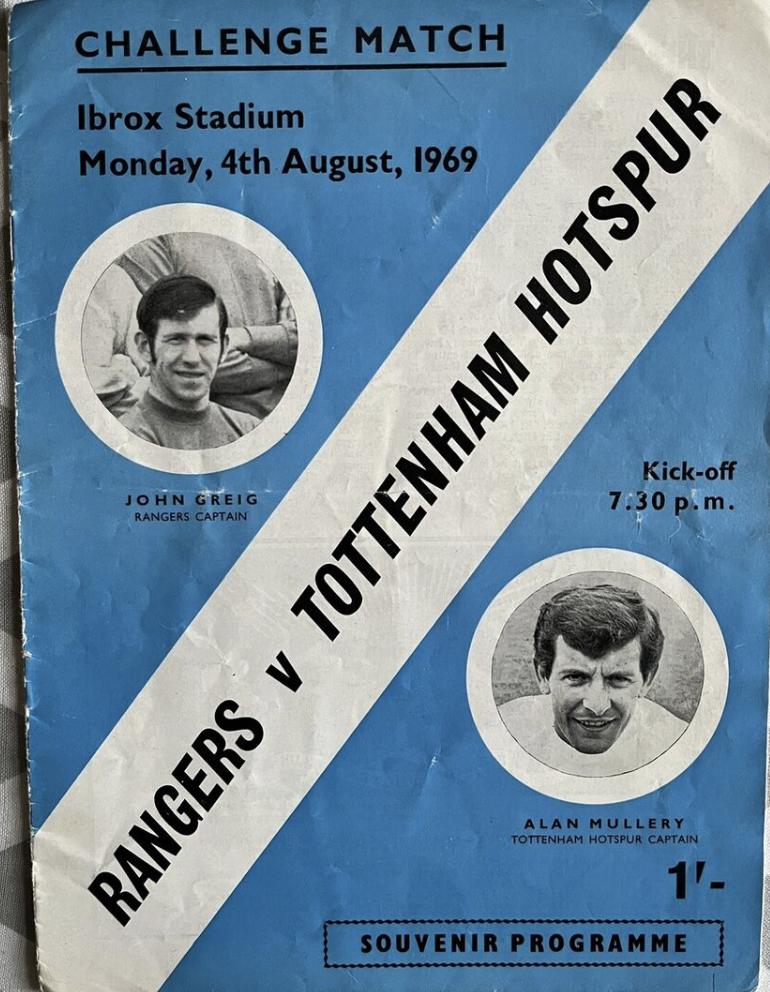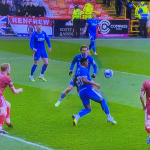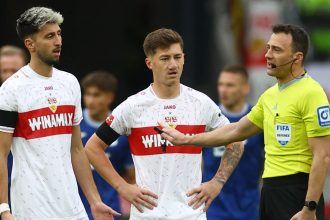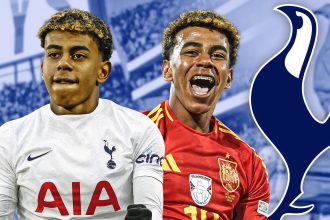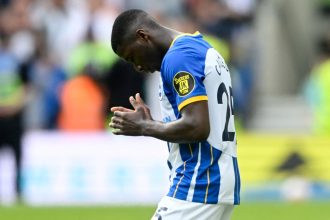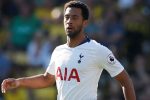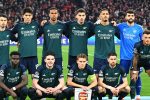By Alistair Aird
Rangers take on Tottenham Hotspur at Ibrox Stadium on Thursday. The tie grabbed the attention of both sides when the draw was made. There was the sub plot of the return to Glasgow of Ange Postecoglu not to mention the whetting of the appetite for another cross-border clash. While the relationship between Rangers and Spurs isn’t quite as famous as that between the Light Blues and Spurs’s North London rivals, Arsenal, the pair have clashed on 14 occasions over the years, and this article will look at the first two of those matches when arguably the two foremost sides in Scotland and England were drawn together in the first round of a relatively new European competition in 1962.
The landscape of Scottish football in the early 1960s was far removed from what it is now. There was no such thing as an Old Firm hegemony. While Rangers, under the guidance of Scot Symon, were at the forefront when it came to competing for honours, Celtic were also-rans, finishing as low as ninth in the 18-team Scottish First Division in season 1959/60. Instead, the challengers to Rangers were the likes of Hearts, Dundee and Kilmarnock, with the now defunct Third Lanark also in the mix when they finished third on the league ladder in season 1960/61.
Most Read on FollowFollow.com No change of Heart – Rangers 0 – 2 Hearts The Follow Follow Friday Preview – 22 August 2025 Dessers Departs – A look back at Cyriel
Dundee, managed by Bob Shankly, brother of Liverpool legend, Bill, won the Division One title in season 1961/62 – the catalyst had been a 5-1 win at Ibrox that featured four goals from Alan Gilzean – and they would go on to reach the semi-finals of the European Cup the following season. Meanwhile, Rangers, runners-up in the league, had won both the League Cup and the Scottish Cup. Success in the latter had booked them a place in what was a relatively new continental competition called the European Cup Winners’ Cup.
Born in season 1960/61, Rangers had reached the inaugural final of the competition, losing 4-1 on aggregate to Fiorentina. Ostensibly, the runners and riders were made of the winners of the domestic cup competitions in each European country, hence why Rangers were in the draw for what was the third iteration of the tournament in season 1962/63. Incidentally, Rangers would qualify in later years as runners-up in the Scottish Cup Final, but that only happened as the Cup winners were also the league champions.
Joining Rangers in the hat in 1962 were Bill Nicholson’s Tottenham Hotspur. Nicholson, who had made over 300 appearances in his 18 years as a player at White Hart Lane, had taken over from Jimmy Anderson as manager in October 1958. And over the next few years, he built a team that would dominate English Football as the world swung into the Sixties.
Spurs became only the third side in English football history to complete the Domestic Double of First Division championship and FA Cup in season 1960/61. They were also the first to do so since Aston Villa back in season 1896/97. But Spurs failed to repeat the feat the following season. They finished in third place in the league, four points adrift of champions Ipswich Town who were managed by a chap called Alf Ramsey. And in a similar vein to the game in Scotland, leading lights of today’s game were sulking in the shadows. Chelsea were relegated, Manchester City finished 12th, Manchester United 15th, while Liverpool were winning the Second Division title to get themselves back into the top flight.
Spurs had secured their place in the Cup Winners’ Cup draw by defeating Burnley 3-1 in the FA Cup Final. A couple of weeks after goals from Ralph Brand and Davie Wilson had given Rangers success in the Scottish Cup against St Mirren, Jimmy Greaves, Bobby Smith and a penalty from Danny Blanchflower found the net at Wembley to give rise to the possibility of another ‘Battle of Britain’ similar to that witnessed when Rangers had overcome Wolverhampton Wanderers at the semi-final stage of the same competition a couple of years earlier.
Twenty-five teams were entered into the draw, although Olympiakos withdrew before the Preliminary Round took place. Spurs were one of seven teams that received a bye, while Symon’s side drew Seville.
Ahead of the first leg at Ibrox, Rangers had been rampant. Four wins from six had seen them top their League Cup section, scoring 19 goals in the process. And they also got their league campaign off to a winning start with a 3-0 home win over St Mirren.
The spate of goals continued when Seville visited Glasgow too. Jimmy Millar scored a hat trick, and a further goal from Ralph Brand put Symon’s side in a comfortable position to progress. But when Rangers travelled to the land of the oranges a few weeks later, they got a fright, losing 2-0 in a match that degenerated into a series of pitched battles that escalated to such an extent that the Portuguese referee had to call a halt to proceedings two minutes before the end of the regulation 90 minutes.
The draw for the first round proper took place in Berne in early October, and when Rangers were paired with Spurs, the media immediately launched into hyperbole, billing the tie as the ‘Match of the Century’.
The first leg of the tie was scheduled for White Hart Lane on 31 October. Four days before heading for London, Rangers had stretched their lead over Hearts at the top of the league to three points courtesy of a 3-2 win over Aberdeen at Pittodrie. Rangers had led 2-0 thanks to goals from Millar and Wilson, but after being pegged back to 2-2, John Greig grabbed the winner with nine minutes remaining.
For their part, Spurs had consolidated their position at the top of the English First Division with a comprehensive 5-1 away win over Leyton Orient. Three days earlier, watched by Scot Symon, they had thumped Manchester United 6-2, and in September, they had hammered Nottingham Forest 9-2. That prolific pattern should have convinced Symon to adopt a cautious approach for the first leg in London, but while he enjoyed great success as Rangers manager, he didn’t possess much in the way of tactical nous. That perhaps explains why he elected to make the change he did to the XI that had eked out the win over Aberdeen.
Matchwinner Greig was replaced by Ian McMillan at inside-right. Cyril Horne, writing in the Glasgow Herald, reckoned this was a sign of intent; Rangers were going to attack. Horne reckoned that ‘the slightly-built former Airdrieonians player would be much less effective [at defending] than the tall, powerful Greig.’ In the end, the decision to omit Greig and the defensive astuteness he brought would backfire on Scot Symon.
Rangers flew from Renfrew to London two days before the match and stayed in a hotel in Marble Arch. But plans to train on the pitch at White Hart Lane the following day were kiboshed by a storm.
Bill Nicholson had instructed the White Hart Lane groundstaff to cover the pitch with polythene sheets and when the Rangers players arrived at the ground, one journalist said that there were ‘lakes of water’ sloshing around on top of the pitch covering. That meant the players had to retreat to the running track and gymnasium to train. When the session was over, Symon informed the press that his players would have free time after lunch before heading to the London Palladium in the evening. On the day of the game, there would be more free time in the morning followed by some rest in the afternoon.
Rangers, it seemed, were ready. On the contrary, they weren’t and were caught like rabbits in the White Hart Lane floodlights.
Symon named the following players in his starting XI:
Billy Ritchie, Bobby Shearer, Eric Caldow, Harold Davis, Ronnie McKinnon, Jim Baxter, Willie Henderson, Ian McMillan, Jimmy Millar Ralph Brand and Davie Wilson
Thus, his team was just one player short of the fabled team from that era that trips off the tongue. John Greig would replace Harold Davis, although that famous XI only played together as a collective five times.
Symon’s counterpart, Nicholson, put his faith in the following:
Bill Brown, Peter Baker, Ron Henry, Danny Blanchflower, Maurice Norman, Dave Mackay, Terry Medwin, John White, Les Allen, Jimmy Greaves and Cliff Jones
There was a Scottish flavour to the home side. In goal was Bill Brown. He had joined Spurs from Dundee for £16,500 in 1959 and he missed only one game in that historic Double winning season. At left half was Dave Mackay. He had arrived in London a couple of months before Brown after winning the league title, the Scottish Cup and two League Cups with Hearts. And wearing the number eight shirt was John White. Like his compatriots, he had made the journey south of the border after impressing in the Scottish League, joining Spurs from Falkirk in October 1959. Nicknamed ‘The Ghost’ as he used to ghost into opposition territory unnoticed, White was a vital cog in Nicholson’s system. Tragically, he was killed in 1964 when he was struck by lightning while out playing golf.
Symon’s side simply couldn’t handle Spurs, although the ‘team of plodders’ sub-headline in the Evening Times was perhaps a tad harsh. Behind after only five minutes – living up to his nickname, White came in and headed in a corner from Jimmy Greaves – a goal from Willie Henderson failed to stem the tide. By half-time another goal from White – a carbon copy of his first – and a double from Les Allen had the home side 4-2 ahead, the header from Jimmy Millar two minutes shy of the interval appearing to be nothing more than a consolation for Rangers. Spurs added a fifth goal in the second half, and only the intervention of Billy Ritchie, who denied Mackay, Allen, Greaves and Cliff Jones, prevented the margin between the teams being much wider.
There seemed little hope that tide could be turned back in Rangers’ favour when the teams met for the return leg in Glasgow. That was scheduled for 5 December, but thick fog enveloped Glasgow that day and when the French referee arrived at Ibrox at 6.30pm – an hour before kick-off – he deemed that the match couldn’t go ahead. It was rearranged for the following Tuesday, 11 December.
Rangers went into the match off the back of a 6-1 thrashing of Kilmarnock at Ibrox, a result that kept them ahead of Partick Thistle at the top of the table on goal average. Meanwhile, Spurs lost 1-0 at Bolton to slip to third place, three points adrift of leaders Everton.
Despite the daunting deficit, the Rangers fans turned out in numbers, with the official attendance recorded as 78,642. The home side were unchanged from the loss in London while Spurs made only one alteration, Les Allen dropping out with his number nine jersey being taken by Bobby Smith. Smith would score twice on the night, but his name is etched in the minds of Rangers supporters because of horrendous tackle on Eric Caldow in an international match at Wembley in 1963. Caldow’s leg was broken in three places and his top flight career effectively ended at that point.
Any lingering hopes that Rangers would mount a monumental comeback were dashed before 10 minutes had elapsed when Greaves burst forward and outpaced the Rangers rearguard before drawing Ritchie and firing the ball unerringly into the net.
Greaves was a class apart that night. More of an inside-forward than a number nine, Greaves had netted 132 goals in 169 appearances for Chelsea before he joined in AC Milan in 1960. His stay in Italy was brief, yielding nine goals in 14 appearances. At that point, Bill Nicholson brought him back to England for a fee of £99,999 and he certainly hit the ground running, scoring three times on his Spurs debut in a match against Blackpool. That maintained a remarkable statistic as Greaves had also scored on his debut for Chelsea and AC Milan. He would do likewise for West Ham United after he left Spurs. And when he did, Greaves had scored 266 goals in 379 appearances. That marked him out as Tottenham Hotspur’s top goalscorer of all-time, a record he kept until it was surpassed by Harry Kane in 2023.
Pride was all that was at stake at this point. Brand levelled on the night with a header two minutes into the second half, but Smith grabbed his first of the evening just three minutes later. Davie Wilson restored parity again with 16 minutes left, but Spurs sealed an emphatic 8-4 aggregate win when Smith soared to head in a cross from Dave Mackay in the final minute.
Both matches had been chastening experiences for Rangers, but they responded emphatically once they returned to domestic duties. Symon’s side won nine league games in a row, and in the 19 league fixtures that remained after the aggregate loss to Spurs, only one was lost while four were drawn. Celtic were thumped 4-0 at Ibrox on New Years Day, and Rangers romped to the title, finishing nine points better off than second-placed Kilmarnock.
The Scottish Cup also made its way up the marble staircase and into the Trophy Room. Airdrie, East Stirling, Dundee and Dundee United were beaten en-route to an Old Firm final. And after the first match ended 1-1, Rangers bossed the replay, winning by three goals to nil.
Success was very much built on a foundation of attacking flair. Jimmy Millar scored 43 goals in 50 appearances, Ralph Brand netted 37 in 52, while wee Davie Wilson added 32 goals in 50 games. The aggregate total of 112 remained unsurpassed until a little-known trio called Messi, Suarez and Neymar combined to score 116 times in season 2014/15.
Spurs could not mirror Rangers’ domestic dominance. They finished second behind Everton in Division One and lost out to Burnley in the third round of the FA Cup. But they broke the mould in Europe, becoming the first British club to win a European trophy when they defeated Athletico Madrid 3-1 in Rotterdam to lift the Cup Winners’ Cup.
Rangers and Spurs have met on numerous occasions since those two ties, albeit in friendlies and testimonials. After a 3-1 win for Spurs in July 1968, the sides met at the Varsity Stadium in Toronto in June 1969. Colin Stein was ordered off – the fourth time he had seen red since joining the club for £100,000 from Hibernian the previous October – while Jimmy Greaves scored a hat trick in a 4-3 win for Spurs. And that kicked off an annual encounter that alternated between White Hart Lane and Ibrox for a couple of years.
The pair also met at Ibrox in August 1980 to mark the opening of the Broomloan Road stand – Ian Redford and Colin McAdam scored for the home side in a 2-1 win – and Jock Wallace’s last match in charge of Rangers was an abject 2-0 defeat against Spurs in April 1986. Only 12,665 turned up to witness John Chiedoze and Paul Allen score the goals. Wallace branded the performance ‘a disgrace’, but the end was nigh for the man who remains the only manager to have delivered two domestic Trebles while serving as the Rangers manager.
A matter of months later, Rangers, under the stewardship of their first-ever player-manager, Graeme Souness, drew 1-1 at White Hart Lane in a testimonial for Paul Miller, and in 1989, a certain Maurice Johnston made his first appearance at Ibrox as a Rangers player in a glamour friendly against Spurs.
Despite the furore that followed the recruitment of the former Celtic centre-forward, a crowd numbering 41,214 basked in the summer sun and watched Rangers emerge with a 1-0 win thanks to a goal from the other major signing that pre-season, Trevor Steven. They were also treated to a rammy between Ian Ferguson and Paul Gascoigne after the feisty duo clashed early in the second half. Several skirmishes followed after the Geordie genius took umbrage to a typically forceful Ferguson tackle. Perhaps Gascoigne was perturbed that Ferguson was getting the better of him, but before matters boiled over, Ferguson was substituted. Remarkably, just six years later, the pair would stand shoulder to shoulder as vital component parts in the Rangers engine room. Clearly by then the August altercations in 1989 had long since been forgotten.
There have only been two further meetings of the sides since that match in 1989. Goals from new recruits Dado Prso and Nacho Novo earned Rangers a 2-0 at Ibrox in 2004, while Harry Kane grabbed a brace when Spurs came to Glasgow in the summer of 2022 and won 2-1.
Rangers’ overall record in the 14 matches between the teams is as follows:
History therefore doesn’t favour Rangers, but Thursday could be viewed as a ‘free hit’. Given how well Philippe Clement’s side have performed thus far in the Europa League, defeat is unlikely to derail chances of making it to the knockout stages. But given the fluctuating fortunes of Spurs recently, Rangers might be in prime position to hammer the final nail into the Postecoglu coffin. The Aussie’s coat is hanging on the proverbial ‘shoogly nail’, and his gung-ho approach is now finding less and less favour among the Spurs support. One would suspect a win for Rangers would see him relieved of his managerial duties at the Tottenham Hotspur Stadium, and that may well give the Ibrox followers just as much satisfactions as another three Europa League points would.
